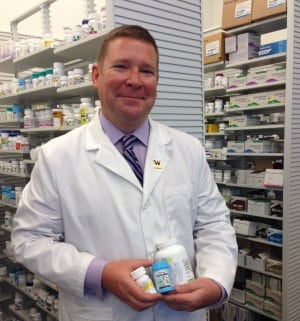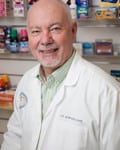
Never doubt the profound impact that our faculty and alumni have had on health care nationwide through decades of advocacy for increased access to patient care.
“Pharmacists are the medication experts on the health care team and in the community. Thanks to our work, in addition to improved care at hospitals and clinics, busy people can just pop into their local pharmacy to get the care they need.”—Don Downing, ’75, I2P2 Endowed Clinical Associate Professor
Increasingly, deadly illnesses are becoming chronic illnesses thanks to advances in drug development and improved medical care. This change calls for increased interprofessional expertise on the health care team—which is where pharmacists come in.
The movement to increase the role of the pharmacist on the health care team began in earnest forty years ago. In 1979 Washington became one of the first states in the country to enact legislation to allow pharmacists to participate in collaborative drug therapy agreements (CDTA) with physicians. UWSOP alumnus Tim Fuller, ’69, was instrumental in the process to create these agreements.
As noted in Sean D. Sullivan’s article, “Pharmacists as health care providers” in the Journal of the American College of Clinical Pharmacy, “In addition to granting pharmacists dependent prescriptive authority, the revised Practice Act allowed for the direct administration of drugs, drug use monitoring and management, and the ability of pharmacists to order, review, and use laboratory tests to modify drug therapy.” Most importantly, these services were extended to all licensed pharmacists in the state, as long as they had a CDTA.
The 1990s saw big changes in pharmacy practice in Washington state. Recognizing that pharmacists were both underutilized and the most accessible health care providers, Jackie Gardner and Don Downing, ’75, worked together to expand what a pharmacist could do. They began with advocating for and training pharmacists to administer vaccinations—now a nationwide and growing global practice.
Don and Jackie went on from that success to develop the nation’s first pharmacist-provided emergency contraception program and the first pharmacist-initiated ongoing hormonal contraception services. In 1995, the “Every Category of Health Care Provider Law,” was passed, stating that private insurance companies could not exclude licensed providers from their networks, so long as the services provided were within the scope of their license. Initially not considered eligible under this Act, Don advocated for pharmacist inclusion. In 2013, he petitioned the Washington State Insurance Commissioner and the Attorney General to issue legal opinions that Pharmacists had to be included. He followed those supportive opinions with advocating for legislation that required insurers to compensate pharmacists for their clinical work, not just drug dispensing.
That legislation passed successfully in 2015.
The increased access to care provided by pharmacists has been supported by the alumni-supported Institute for Innovation in Pharmacy Practice (I2P2) Endowment.
 Jackie Gardner | Epidemiologist & Legendary Advocate for Increased Access to Care
Jackie Gardner | Epidemiologist & Legendary Advocate for Increased Access to Care
Jackie was co-director of the Retail Pharmacy Management Program and led the Institute for Innovation in Pharmacy Practice (I2P2)—the I2P2 fund was later named after her—in addition to being an early PORPP faculty member. She worked as a pharmacy technician, which inspired her strong advocacy for expanding pharmacy services to include immunization, contraception, and other value-added care. “Jackie changed the profession of pharmacy and the way individual pharmacists embraced patient care,” said Don Downing.
Tim Fuller, ’69 | Father Of Pharmacist Collaborative Drug Therapy
Tim was instrumental in the process to create collaborative drug therapy agreements. He began with a study of the 60 prescriptive authority protocols that were filed in the Board of Pharmacy office, showing an overwhelmingly positive response by physicians and pharmacists to pharmacists prescribing in collaboration with physicians. He worked with pharmacists to expand this practice. His book, The Handbook of Collaborative Drug Therapy, provided templates for pharmacists to use. He is the 2018 PAA Distinguished Alum.
 Don Downing, ’75 | Advocate for Pharmacy and Women’s Reproductive Health
Don Downing, ’75 | Advocate for Pharmacy and Women’s Reproductive Health
After graduating from UWSOP, Don was asked by the Puyallup Tribe to help them open up a tribal health clinic – a clinic where he remained for the next 10 years. He developed the nation’s first pharmacist-provided emergency contraception program and the first pharmacist-initiated ongoing hormonal contraception services. He also helped lead the effort in the 1990s to educate and certify pharmacists in Washington state and numerous other states to provide flu shots and other vaccines.
 Jennifer Bacci | Assistant Professor & Community Pharmacy Researcher
Jennifer Bacci | Assistant Professor & Community Pharmacy Researcher
Jennifer’s primary research interest focuses on the application of implementation science to evaluate and advance the adoption and reach of innovative patient care models in community pharmacy practice, including being co-investigator on PROJECT VACCINATE with Peggy Odegard. The team saw a 14% increase in the number of influenza, pneumococcal, herpes zoster, and pertussis vaccinations in just one year as a direct result of their work, which was supported by the Centers for Disease Control and Prevention (CDC) and National Association of Chain Drug Stores (NACDS).
To study with UWSOP’s top faculty in health economics and outcomes, medicinal chemistry, and pharmaceutics, click here for more information about our Graduate Programs in Medicinal Chemistry, Pharmaceutics, Pharmaceutical Outcomes Research and Policy, and Biomedical Regulatory Affairs.
Want to earn your PharmD professional degree at the UW? Start here to learn more.